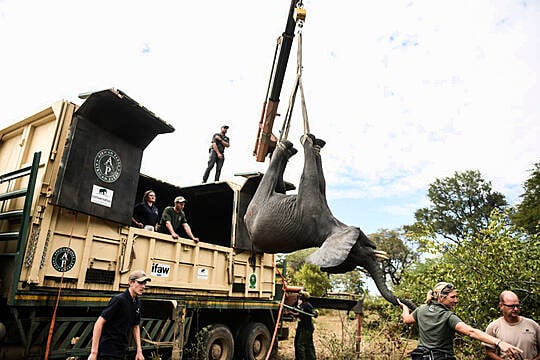One by one, 250 elephants are being moved from Malawi’s overcrowded Liwonde National Park to the much larger Kasungu park 380 kilometres (236 miles) away in the country’s north.
The elephants are tracked in the park and darts are fired to sedate them.
While in slumber they are moved into the large trucks that take them to Kasungu National Park.
So far at least 40 elephants have been moved and the rest should go by the end of the month at a total cost of about 1.5 million US dollars (£1.2 million) to two million dollars (£1.7 million), according to officials.

In addition, about 405 other wildlife, including buffalo, impala, sable, warthog and waterbuck will be moved to Kasungu.
The entire process is a co-operation between Malawi’s Department of National Parks and Wildlife, the International Fund for Animal Welfare and African Parks.
“This will establish viable elephant populations, and ensure the prosperity of local communities living around the parks. It will also alleviate habitat pressure and reduce human-wildlife conflict,” African Parks representative in Malawi Sam Kamoto said.
African Parks is a non-profit organisation that manages and rehabilitates national parks in partnership with governments and local communities.
The group currently manages 20 national parks and protected areas in 11 African countries, including Malawi.
Since 2015 Liwonde National Park has been managed by African Parks, which found that its more than 600 elephants are threatening the park’s vegetation and biodiversity.

Liwonde’s 548 square kilometres (211 square miles) of floodplains, lagoons and woodlands support more than 400 species of birds and many mammals.
But its elephants, breeding at a rate of 10% per year, could soon overwhelm the park, said experts.
In contrast, Kasungu National Park is about four times larger at 2,100 square kilometres (810 square miles) but has much less wildlife.
Kasungu once had about 1,200 elephants but years of poaching reduced the number to about 49 in 2015, said parks officials.
Since then Malawi’s national parks and international groups, including the US Agency for International Development, have collaborated to improve protection for the elephants and Kasungu park’s elephant population has grown to about 120.
The introduction of 250 elephants from Liwonde will promote population viability in Kasungu, he said.
“The translocation of the elephants and other wildlife is a significant achievement and proves the national parks’ approach to working with partners to secure its natural resources is a sound one,” said Patricio Ndadzela, a representative in Malawi of the International Fund for Animal Welfare.

A 40-kilometre (25-mile) elephant-proof fence has been built along Kasungu park’s eastern boundary to prevent elephants from straying into farmland and will prevent conflict between communities and the elephants, said Mr Ndadzela.
Restoring Kasungu’s elephant population will boost its appeal as a tourist destination and in turn improve the local economy, he said.
This is not the first time that a large number of elephants have been moved from one park to another in Malawi.
In 2016, African Parks relocated 520 elephants to Nkhotakota Wildlife Reserve.







